The world's five happiest cities for 2025
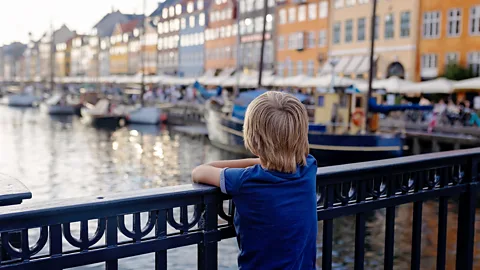 Alamy
AlamyFriends, family and a sense of community all can lead to happiness, but the environment you live in can also have a huge impact on your wellbeing. Yet, what exactly makes a "happy city"?
To find out, researchers at the Institute for the Quality of Life recently released their 2025 Happy City Index, tracking 82 indicators of happiness across six major categories including Citizens, Governance, Environment, Economy, Health and Mobility. The index measured the policies that contribute to the quality of life, as well as their implementation and impact on residents.
The index noted that no city should ultimately be considered "the happiest", instead naming a group of 31 cities that made the "Gold Cities" list, indicating especially strong scores across all metrics. To find out what kind of policies and features truly make up a "happy city", we spoke to residents living in the five top-scoring places around the world.
1. Copenhagen, Denmark
Denmark frequently ranks in the happiest countries index, so perhaps it's no surprise that its capital city received the highest overall score. Copenhagen scores exceptionally well in the Environment category, which ranks its green spaces, sustainability and waste management; and the Economy category, which factors in items like GDP, median salary and overall innovation and international company presence.
TOP 10 GOLD "HAPPIEST" CITIES
1. Copenhagen
2. Zurich
3. Singapore
4. Aarhus
5. Antwerp
6. Seoul
7. Stockholm
8. Taipei
9. Munich
10. Rotterdam
See the full list here
The city also ranked well in the Citizens category, which includes cultural resources like libraries and museums, as well as resident engagement and events. For permanent resident Mari-Anne Daura, the lively food and cultural scene keeps her loving where she lives.
"The city is always organising free events, whether it's The Copenhagen Light Festival, The Human Library, Copenhagen Cooking or the Distortion Street Parties. I appreciate how much effort the city puts into curating experiences for its residents," she said. "There is always something to do and something new to experience, which is what made me choose to live in Copenhagen over Stockholm."
Residents also appreciate Copenhagen's emphasis on alternate and safe modes of transport. "Nearly one-third or more of the population bikes and the city itself has its own bike lane, which many people use to commute to and from the city. The metro system also runs like clockwork," said resident Aaron Wertheimer.
He recommends visitors rent a bike and cycle over Langebro bridge to Hans Christian Anderson Boulevard. "You can see the entire city, its canals and its beautiful architecture, and you'll gain a greater appreciation for the city's aesthetic and overall atmosphere," he said.
Daura recommends hopping on a water bus to experience the city from another angle. "Check out the vibe and the wide variety of food trucks at Reffen [Northern Europe's largest street food market]," she said. "To me, nothing is more Copenhagen than Reffen."
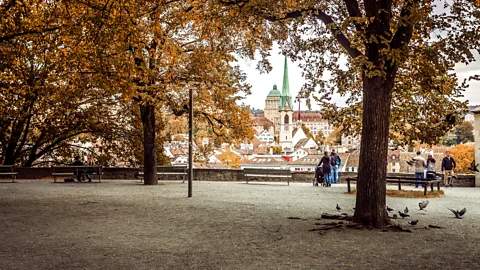 Getty Images
Getty Images2. Zurich, Switzerland
Ranked second highest in the index, Switzerland's largest city received especially high marks in the Citizens category as well as the Governance category, which measures citizen participation in government policies and access to digital services to improve life for residents.
This overall ease of living makes it much more stress-free, according to residents. "As a mum of two, Zurich is the perfect place to raise a family," said resident Raquel Matos Gonçalves, who helps residents relocate to Switzerland through her company Expat You. "The main pain points of daily life are fully addressed: very safe (kids can go to school alone from kindergarten); public transport that is always on time; and Zurich is an exceptionally clean and organised city."
She adds: "All these aspects make daily life so easy, so predictable, that they absorb the stress you'd otherwise experience."
The city has clear rules and guidelines, too. "The unofficial motto is 'If it doesn't say yes, assume it's a no,'" said resident Amelie Guiot, meaning that everyone stays within the bounds of the law and rules, keeping infrastructure like streets and public transport orderly and clean. She also appreciates the free drinking water from the city's 1,000-plus public fountains.
Guiot recommends visitors check out the Kunsthaus Zürich, Switzerland's biggest art museum – though the city has more than 50 other museums for more niche interests. On a sunny day, everyone migrates to lakeside badis (public bathhouses). "My favourite is Frauenbad Stadthausquai, a women-only wooden bathhouse," she said.
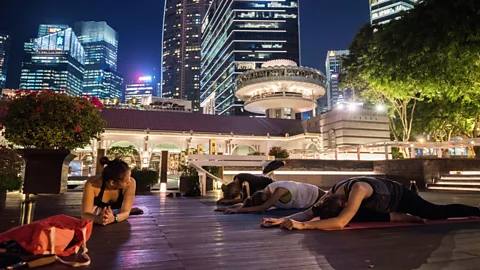 Alamy
Alamy3. Singapore
The city-state of Singapore often ranks high in various indexes, especially as one of the happiest countries in Asia due to its ease of doing business, cleanliness and infrastructure. In the 2025 Happiest City Index, it scored particularly well in the newly created Health metric, which tracks overall safety, public health initiatives like vaccinations and financial protection for health expenses.
It also ranked high in Governance, a metric where residents have seen policies ease the cost-of-living burden that has plagued other cities around the world. "While Singapore has become really expensive, a good and early public housing scheme (HDB) along with rising housing prices has helped many Singaporeans to have not only a home but a financial asset that could potentially be cashed out for retirement or emergencies," said resident Hwee-Boon Yar. "The tiny island's size and neighbours has been a strong force to ensure the city stays competitive, yet friendly with other countries."
Residents also appreciate how the city's infrastructure makes it easy to enjoy life. "Beyond convenience, Singapore's policies around green space, safety and multicultural inclusivity really stand out. You can go from pitching a global client downtown to enjoying satay by the waterfront, all in the same evening," says resident Samuel Huang who owns a Singapore-based business.
For first-time visitors, he recommends a walk through the hip neighborhood of Tiong Bahru, "where history, food and design meet local life in the most charming way possible", he said.
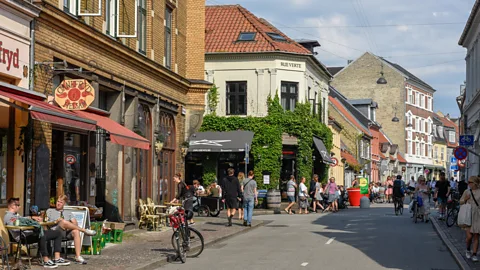 Getty Images
Getty Images4. Aarhus, Denmark
As Denmark's second-largest city, Aarhus often gets called the "world's smallest big city", something that helps residents stay happy by combining urban amenities with a small community feel. The city scored well across all metrics, but especially in Citizens, Environment and Health – factors that residents say come across in the ease of life here.
"Joy is seamlessly woven into daily life – not through extravagance, but through intentional design," said resident Carla Niña Pornelos. "I remember cycling to a community dinner on a rooftop garden overlooking the harbour, realising how accessible happiness can be when a city genuinely supports wellbeing."
More like this:
• Why Switzerland is home to two of the world's most liveable cities
She mentions integrated bike lanes, green spaces and free public events that foster a sense of community. The city also prides itself on sustainability initiatives like district heating and waste-to-energy programmes, while healthcare and education are both accessible and high-quality. "It's not just the infrastructure, though," she said. "It's the sense that people trust each other and their institutions."
Home to multiple universities, the city also has an energetic feeling that especially arises after Denmark's long winter. "When spring and summer come around, everyone comes out of hibernation ready to hang out in the parks, swim at the harbour baths or grab a beer by the canal," said local Mathias Steen. "There's such a warm, laid-back vibe; people are everywhere, and the city feels alive."
To get a sense of the city, Pornelos recommends visitors take a walk along the Infinite Bridge at sunrise. "It's a circular pier that stretches out into the sea – quiet, surreal and emblematic of the Danish way of blending nature, art and thoughtful urban planning," she said. "That single moment captures what it's like to live here: balanced, beautiful and profoundly human."
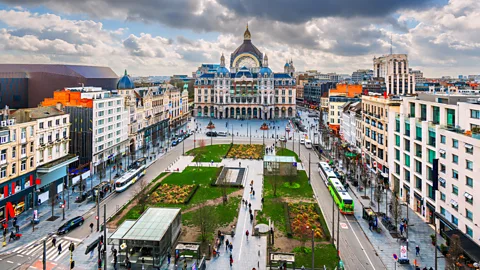 Getty Images
Getty Images5. Antwerp, Belgium
Antwerp managed to inch out larger sister-city Brussels in the Happy Cities index, with higher scores in the Citizens, Government and Environment categories. Residents praise its reliable public transportation, its safe and easy cycling and its compact size – all of which making getting around quick and easy.
"I moved to Antwerp in my late 20s expecting a charming city with good food and beautiful architecture, but I've stayed because of how livable it is," said resident Grace Carter. "There's a calm efficiency here that you start to feel in your day-to-day."
She also notes that the city invests in progressive policies like support for working families, social housing and sustainability that make life easier and more enjoyable. "What really surprised me was how seriously Antwerp takes its green spaces and cultural life," she added. "From the riverside parks to the world-class museums, it's a place where people genuinely make time to enjoy life, not just work through it."
To best see the city, she says it's worth skipping the city's well-trod museum trail to visit the Saturday market at Theaterplein. "Grab a coffee, listen to the local chatter and just soak up that relaxed, quietly confident vibe that makes Antwerp feel like home."
--
If you liked this story, sign up for The Essential List newsletter – a handpicked selection of features, videos and can't-miss news, delivered to your inbox twice a week.
